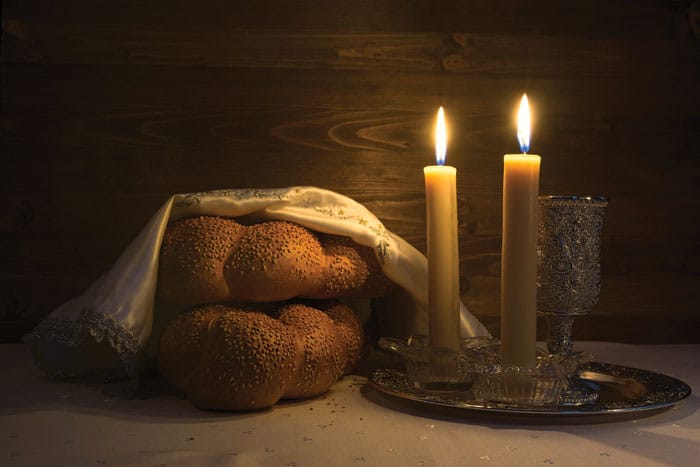
It’s so rare to find anything in today’s world that virtually everyone agrees with. I don’t mean obvious things like “we all need to breathe” or “water is important.” I mean a bona fide religious ritual that requires people to go out of their way to make happen.
I’m talking about the Friday night Shabbat meal.
I’ve never met anyone — religious or non-religious, Jewish or non-Jewish — who thinks it’s a bad idea to gather in person over a meal once a week to reconnect with friends and family. Even when you tell them “no iPhones during the meal.”
I’ve never met anyone — religious or non-religious, Jewish or non-Jewish — who thinks it’s a bad idea to gather in person over a meal once a week to reconnect with friends and family. Even when you tell them “no iPhones during the meal.”
In fact, “no iPhones” may be the best feature of the traditional Shabbat meal. Who can’t use a human break from the tyranny of digital devices that pretty much run our lives?
Some of my favorite memories were born at the Shabbat table. No matter how tired I may be at the end of the week, the presence of guests around the table becomes a source of energy.
But let’s face it: socializing takes effort. Great tables, great meals, great conversations don’t just happen. They require great care. A beautiful gathering can be instantly ruined by an ugly argument over politics. It’s actually a good rule of thumb to minimize politics at a Shabbat table, but not just because politics is divisive.
Politics is very much a weekday subject, while the whole essence of Shabbat is to provide a spiritual break from our usual routine and aim to elevate.
In his magisterial book, “The Sabbath,” Rabbi Abraham Joshua Heschel associates our weekdays with controlling the dimension of space.
“To gain control of the world of space is certainly one of our tasks,” he writes. “The danger begins when in gaining power in the realm of space we forfeit all aspirations in the realm of time.”
In that realm of time, Heschel writes, “the goal is not to have but to be, not to own but to give, not to control but to share, not to subdue but to be in accord.” He might well have described a beautiful Shabbat dinner.
Shabbat, on the other hand, represents the realm of time, an opportunity to sanctify life’s most precious commodity. In that realm of time, Heschel writes, “the goal is not to have but to be, not to own but to give, not to control but to share, not to subdue but to be in accord.”
He might well have described a beautiful Shabbat dinner, when the collective energy is to be, to share, to give, to be in accord.
That’s why it was such an easy decision to devote our cover story this week to the Friday night Shabbat experience; and specifically, to an organization, OneTable, that fully gets it.
As our reporter, Debra Eckerling, explains: “OneTable is on a mission to help young adults establish and maintain a Shabbat practice by making Friday night dinners accessible, sustainable and valuable.”
Because people have such diverse tastes and lifestyles, the OneTable model is flexible to accommodate this diversity and maximize the number of people who will taste Judaism’s great gift to humanity.
As Eckerling writes, “OneTable is like an Airbnb for Shabbat. The website connects hosts with guests and vice versa. There are a variety of options on the site, so guests can find a dinner that is near them, that fits their needs and has like-minded people.”
At a time when we’re still feeling the effects of the pandemic, with its prolonged isolation, the Shabbat meal may be the ideal instrument to reconnect us with our humanity and our communities.
Aliza Kline, the cofounder and CEO of OneTable, who I’ve known for years, says that “the best kinds of interpersonal connections happen around the Shabbat dinner table period. I think there’s something magical and intentional about it.”
Under her leadership, the organization has translated this magic into practice. So far, as Eckerling reports, the impact has been impressive:
“Over the past nine years, nearly 200,000 people have participated in OneTable; more than 90,000 Shabbat dinners have been posted by and for young adults. In Los Angeles, there have been more than 1,200 dinners and 4,000 unique people with nearly 9,000 seats.”
It’s ironic, yes, that to help people enter into the realm of time that Shabbat represents, an organization must first control the realm of space. Indeed, during the week OneTable does all the ordinary things that are required to help people experience the elevating and humanizing dimension of the Friday night gathering.
At a time when we seem to be so divided, what a relief to know that there is at least one idea, one table and one night that can bring us together.
Shabbat shalom.























 More news and opinions than at a Shabbat dinner, right in your inbox.
More news and opinions than at a Shabbat dinner, right in your inbox.